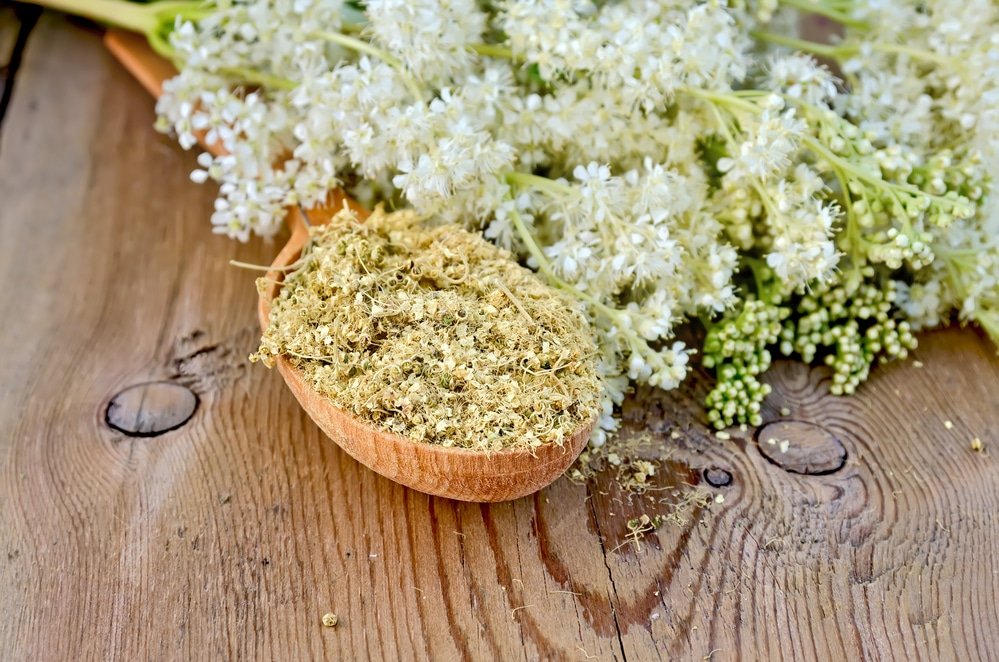Meadowsweet health benefits includes reversing free radical damage, acting as a sweat inducer, enhancing the skin, preventing premature skin aging, help cures cold, promoting digestive health and protecting the stomach and intestines. Other benefits includes fighting inflammation, managing blood pressure, fighting bacterial infection and strengthening the immune system.
What is Meadowsweet?
Meadowsweet is a perennial shrub belonging to the genus Rosaceae, and bears the botanical name Filipendula ulmaria. It grows up to two meters in height and features delicate creamy-white flowers that are arranged in a cymose inflorescence.
Meadowsweet grows abundantly in the meadows (and hence the name) of Europe and some parts in Asia. It is also called the Queen of the Meadow due to the way it stands out in the meadow above all else wherever it grows. The Queen of the Meadow also thrives wildly in swamps, woods, fens, and marshes.
With its beautiful flowers and delightful scent, the meadowsweet is the perfect ornamental plant for your home garden. It also dispels unpleasant odors. However, meadowsweet has more to offer than just decorative purposes. Meadowsweet is valued for its medicinal properties as well. The whole plant including its flowers, leaves, twigs, and roots can be used to treat various ailments. Meadowsweet possesses analgesic, antibacterial, anti-inflammatory, anti-oxidant, astringent, diuretic, and tonic qualities.
Meadowsweet is not a common ingredient in culinary preparations. Nonetheless, it does have a history of being used as an ingredient for wines and beers. You can prepare the meadowsweet herb as tea, decoctions, powders, juice, or even standardize in capsules.
Meadowsweet contains a number of medicinal ingredients including essential oils, flavonoids, quercetin glycosides, and phenolic compounds among several others. Its most notable active ingredient is salicylic acid, a chemical constituent that decreases pain (and is a common component of the well-known analgesic Aspirin). Meadowsweet also has a high tannin content.
11 Proven Health Benefits of Meadowsweet

1. Strong Antioxidant Properties
Meadowsweet highlights an array of antioxidants that promote overall health. Antioxidants can greatly reduce the risk of acquiring serious illnesses including cancer and progressive degenerative diseases such as Alzheimer’s.
The antioxidants present in meadowsweet can help reverse free radical damage and protects you from oxidative stress, which is frequently associated with cell mutations and accelerated cellular breakdown.
2. Meadowsweet is a Sweat Inducer
Meadowsweet, taken as tea, is a soothing diaphoretic. It encourages circulation and opens your pores to release heat out of the body. It is especially recommended for those who may have fever but finding it difficult to sweat and cool the body. Sweat is a natural overheating control mechanism that the body uses to cool itself.
3. Benefits Skin
It is a natural astringent that helps enhance your skin’s appearance by tightening pores and eliminating dirt and excess sebum. Meadowsweet contains salicylic acid, which helps remove pimple-causing bacteria and makeup residue, and can hasten drying up of pimples.
4. Prevents Premature Skin Aging
Meadowsweet’s wealth of antioxidants also prevents photo-oxidative damage that may lead to premature aging of the skin such as appearance of age spots, fine lines, etc. Photo-oxidative damage is that caused by excessive UV exposure, such as being in the sun for long periods each day.
5. Can Help Cures Colds
It has been used in traditional medicine for centuries in treating colds and other associated symptoms. Although there are still no clinical trials to attest to its efficacy, the analgesic as well as anti-inflammatory properties of Meadowsweet makes it a potentially effective antidote. The roots of the herb can also be used to address certain respiratory ailments, which include coughing, sore throats, shortness of breath, and can also function as a mucolytic (breaks down mucus and removes it).
6. Promotes Digestive Health
It can be used as a digestive aid. It relieves acid indigestion by soothing and protecting the mucous membranes of the stomach lining and digestive tract.
Studies have also revealed that meadowsweet can encourage faster healing of chronic ulcers as well as prevent lesions from developing within the stomach. Meadowsweet is also used to remedy gastritis, heartburn and hyperacidity. In addition, it provides anti-inflammatory effects due to its salicylate content, which is useful in treating diarrhea in children. Meadowsweet tastes pleasant, which makes it a good choice for little children.
Moreover, it also shows potential in inhibiting the growth of H. pylori bacteria. Many people have H. pylori living inside them, and though it is normal for the most part, this bacterium is the root of countless digestive ailments such as ulcers and gas. It also increases your risk of acquiring stomach cancer.
A strong decoction made from boiled meadowsweet roots can help you get rid of ulcers.
7. Analgesic Properties
It is suitable for relieving pain, particularly pain with a pounding sensation in a fixed location. The herb’s ability to alleviate pain is due to its salicylic acid content.
Salicylic acid is also the main active compound present in aspirin. However, meadowsweet is often better than aspirin because of the tannins present in meadowsweet. Tannins protect the stomach and intestines; on the other hand, aspirin has no tannins and tends to frequently result in stomach discomfort as a side effect.
Likewise, it is well suited to headaches as it provides a cooling effect while also promoting circulation.
8. Anti-inflammatory Properties
It has a gentle astringency due to its salicylic acid content, which is effective against inflammation. Salicylic acid is commonly derived from Willow, but other chemical constituents of the meadowsweet herb make it easier on the stomach’s lining.
Its salicylic content is beneficial in reducing inflammation in joints, arthritis, and gout while its analgesic properties alleviate pain.
9. It is a Diuretic
Swelling from excessive accumulation of fluids in cells and tissues is called edema. Although edema may vanish on its own, there are some instances where you need diuretics.
When, taken as hot tea, is an effective diuretic. Diuretics help in management of certain conditions such as edema and high blood pressure. Drinking meadowsweet tea helps your body eliminate sodium and excess water; thus, reducing the amount of fluid flowing through your blood vessels. This in turn minimizes the pressure on your vessel walls.
It is also beneficial for individuals with kidneys problems in which their kidneys can no longer filter potassium, as it speeds up water elimination.
10. Anti-bacterial Properties
Modern studies have shown that it is effective against bacterial infections to a large degree. According to researchers, meadowsweet combats harmful infections caused by Staphylococcus aureus, E. coli, Proteus vulgaris, Pylori and Staphylococcus epidermidis bacteria.
The salicylic acid present in meadowsweet serves as a disinfectant that can effectively treat various skin conditions such as acne, eczema, and psoriasis.
11. Helps Fortify Your Immune System
All parts of it’s herb contain significant amounts of phenolic compounds such as the newly discovered flavonoid, ulmarioside. This type of flavonoid is unique to meadowsweet. Recent studies have demonstrated how ethyl acetate extracts show potential in inhibiting T-cell proliferation as well as inhibiting the production of free radicals. This explains the efficacy of the meadowsweet herb in treating inflammatory conditions, such as rheumatoid arthritis.
Conclusion
It has a long and illustrious history. It was considered among the most sacred herbs for the ancient Celtics, as well as notable in literary works during the middle ages. Although most people cultivate this herb for ornamental purposes, the meadowsweet offers a variety of healthy benefits.
It contains a significant amount of compounds such as flavonoids, phenolic glycosides, quercetin glycosides, tannins, salicylates, and acid esters that are all beneficial to health.
Herbalists admire it’s versatile medical applications. The Meadowsweet herb can provide a range of medicinal uses due to its antioxidant, anti-bacterial, anti-inflammatory, analgesic, diuretic, and astringent properties. The herb can also serve as a disinfectant and natural insect repellant. Most importantly, meadowsweet has been recognized as a safer alternative to aspirin, and is particularly attractive for persons with known sensitivities to the medication.



